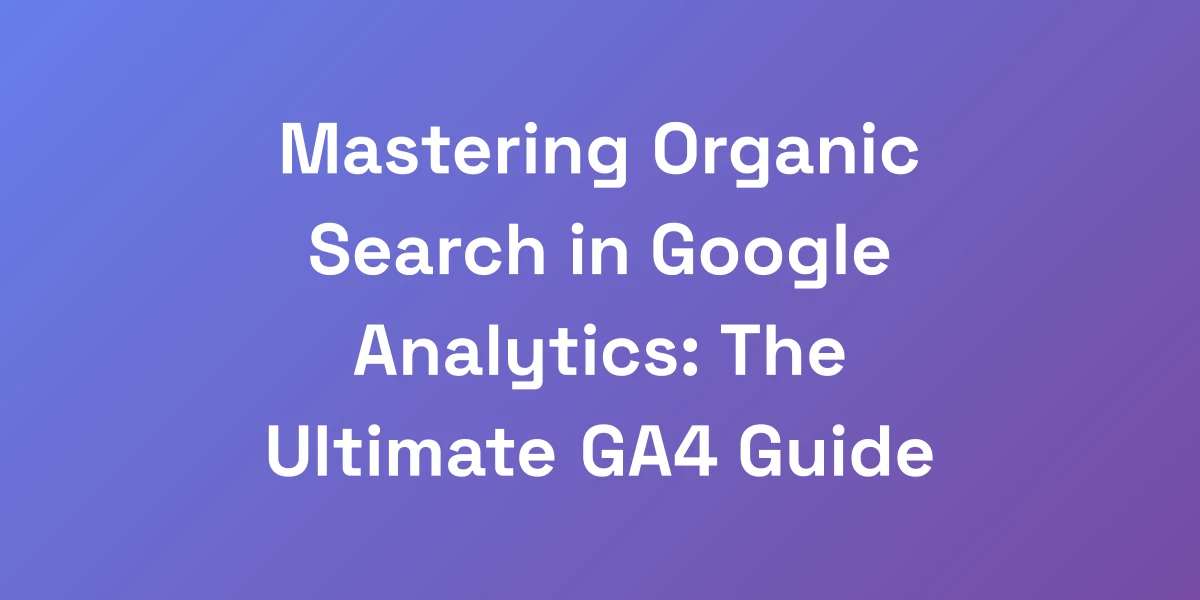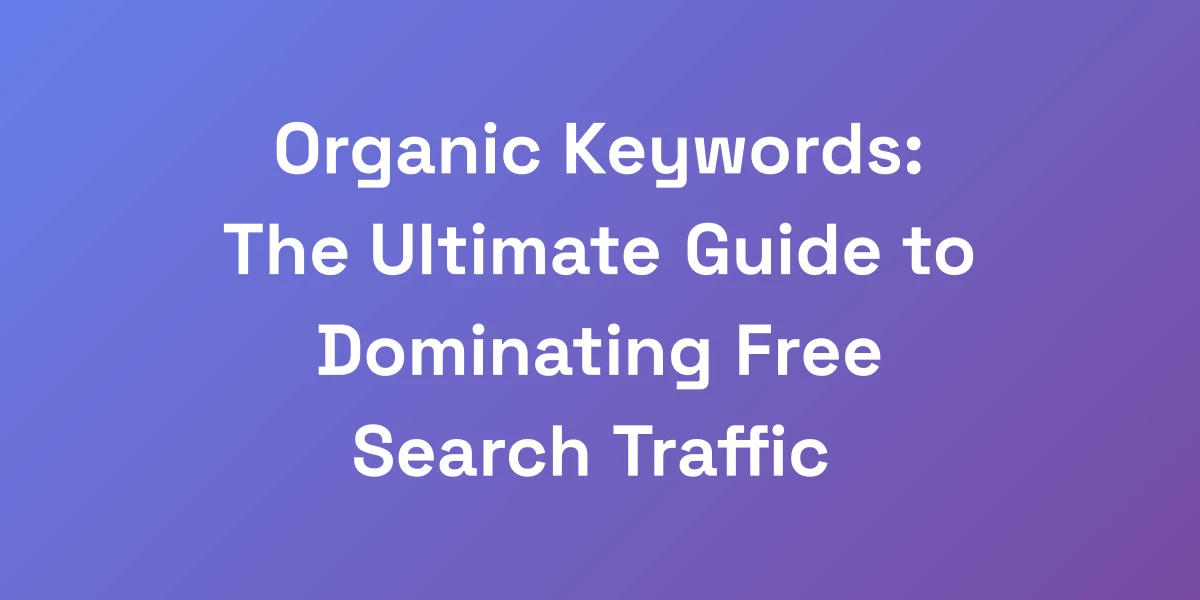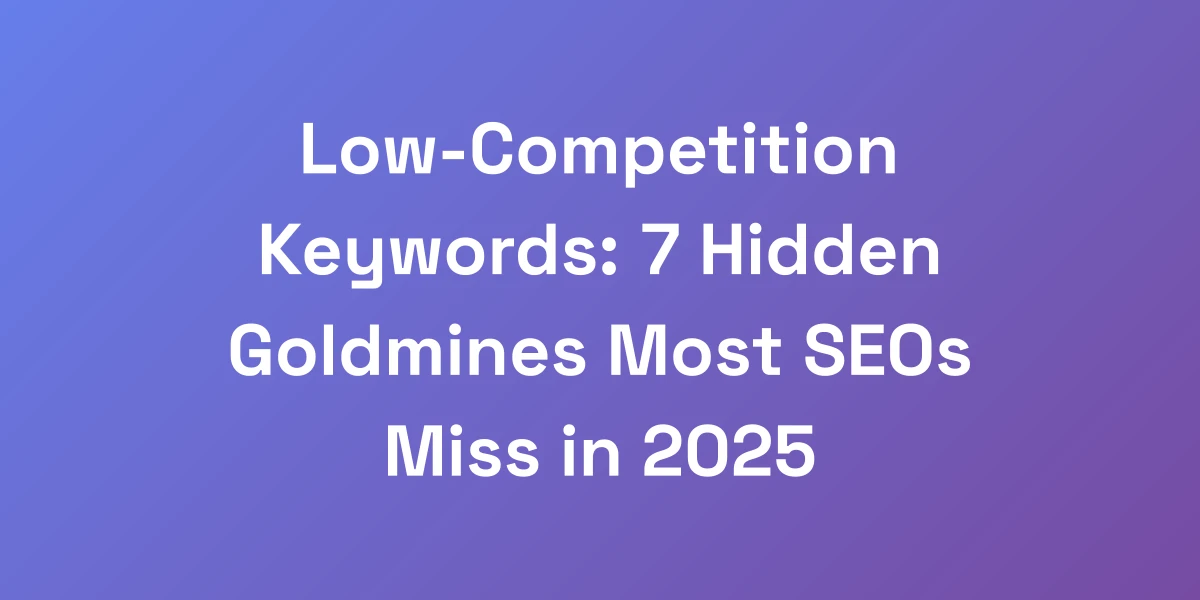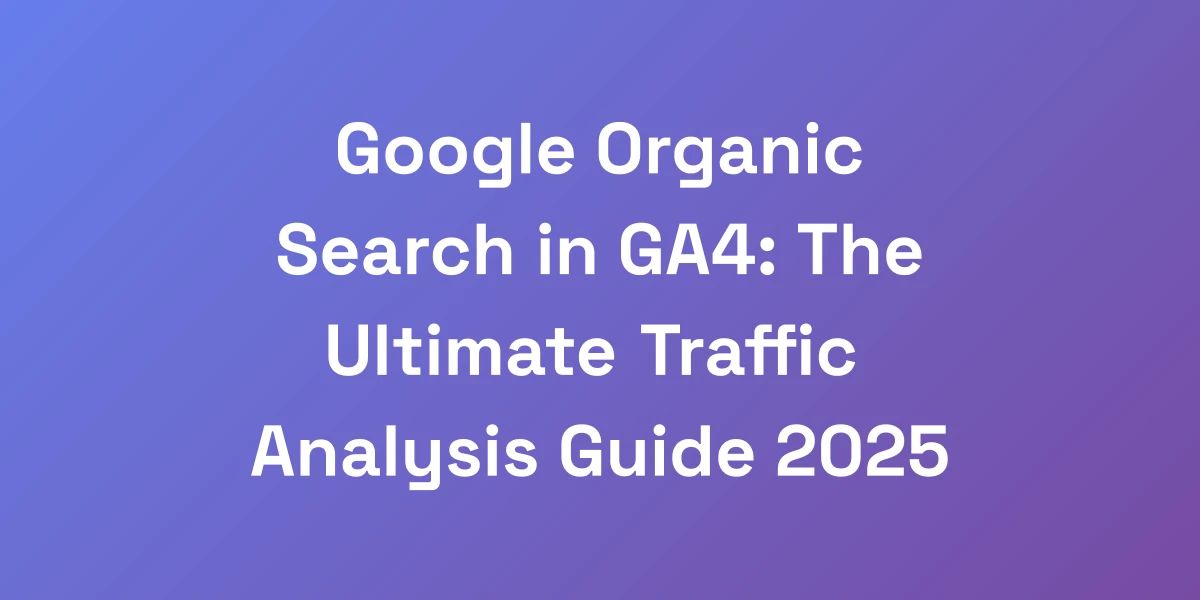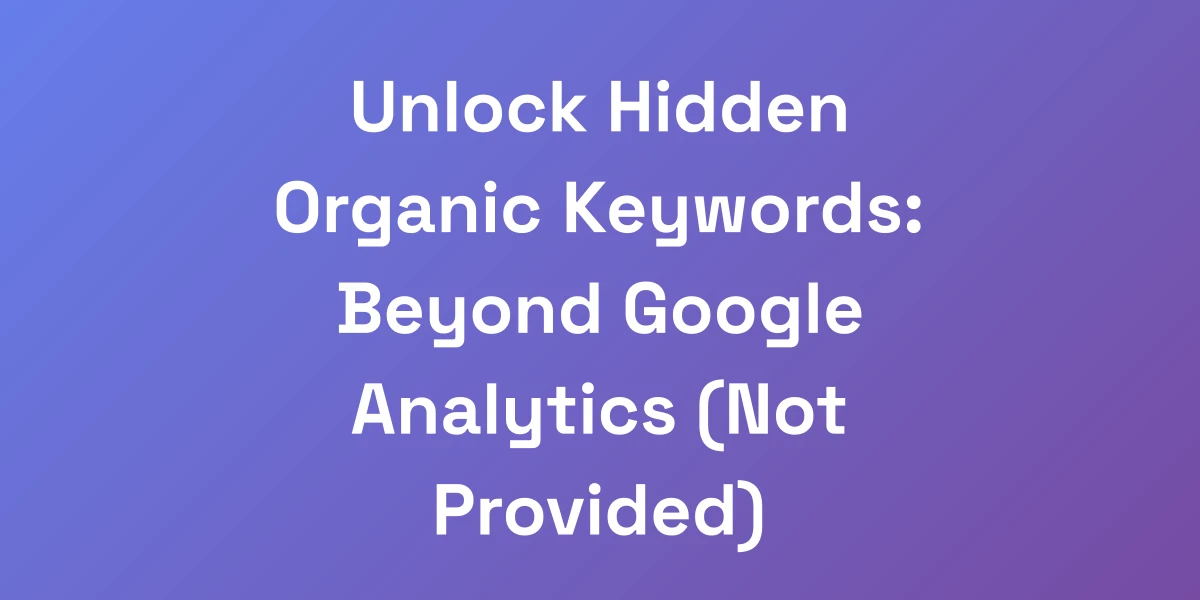
Unlock Hidden Organic Keywords: Beyond Google Analytics (Not Provided)
Mar 6, 2025 | By zishansami102@gmail.com
The Truth Behind Google’s (Not Provided) Keywords
Let us hit you with some truth that most “experts” won’t tell you. When Google started hiding organic keywords with “(not provided)” in 2011, they didn’t just make a small change – they completely transformed how we track SEO success.
But here’s the thing: while everyone else is complaining about lost data, smart marketers are leveraging this challenge into a massive opportunity. The game hasn’t ended; it’s just evolved. And we’re going to show you exactly how to play it to win.
The Evolution of Keyword Privacy in Google Analytics
Back in 2011, Google made a strategic move to encrypt search data for logged-in users, which eventually extended to all users by 2013. This shift was more than just a tweak; it marked the beginning of the end for accessible keyword data in Google Analytics.
Previously, marketers could dive deep into keyword data, analyzing exactly what users were searching for. Now, with up to 97% of keywords labeled as “(not provided)”, we’re navigating a new landscape where guesswork and alternative strategies reign supreme.
Why Google Implemented (Not Provided)
Google’s decision to implement “(not provided)” was rooted in a commitment to user privacy. By encrypting search queries, Google aimed to protect individual user data, aligning with growing global privacy concerns.
But this move also sends a clear message to marketers: the days of transparent keyword data are over. Instead of resisting, those who adapt can turn this challenge into an advantage, uncovering hidden insights through innovative methods.
Impact on Digital Marketing and SEO
The shift to “(not provided)” has sent ripples through the digital marketing and SEO communities. Traditional methods of keyword tracking in Google Analytics became obsolete, forcing marketers to rethink their strategies, considering options like affordable local SEO services or optimizing for Local SEO Near Me searches.
We’ve seen a surge in the adoption of alternative tools and approaches, from leveraging Google Search Console to diving into server log analysis. The landscape has become more complex, but also richer with opportunities for those willing to dig deeper.
The Current State of Organic Keyword Data
Today, organic keyword data remains largely concealed within Google Analytics. However, this doesn’t mean the end of keyword insights. Instead, it signals a new era where data is fragmented across multiple platforms, requiring a more holistic approach to SEO.
Marketers are now piecing together data from various sources, creating a more comprehensive picture of user behavior and search intent. This shift not only compensates for the lost keyword data but also enhances the depth and quality of insights.
Understanding SSL Encryption’s Role
SSL encryption plays a pivotal role in the “(not provided)” phenomenon. By securing data transmission between users and Google’s servers, SSL ensures that search queries remain private and protected.
This encryption not only safeguards user information but also restricts marketers from accessing detailed keyword data. Understanding the technical underpinnings of SSL helps us appreciate the broader implications for SEO and data analysis.
Advanced Methods to Recover Your Keyword Data
Stop settling for incomplete data. While most marketers give up when they see “(not provided)”, we’ve discovered that combining multiple data sources creates an even more powerful insight machine than before.
Think about it – when one door closes, multiple windows open. By leveraging Google Search Console, server logs, and some unconventional tracking methods, you can actually gather more actionable keyword intelligence than ever before. Let us show you how to turn this supposed limitation into your competitive advantage.
Leveraging Google Search Console Integration
Google Search Console (GSC) remains one of the most underutilized tools for recovering organic keyword data. While it doesn’t replace the comprehensive keyword data once available in Google Analytics, it offers valuable insights into search performance.
- Clicks and Impressions: GSC provides data on how often your site appears in search results and how many clicks it receives for specific queries.
- CTR Analysis: By analyzing the click-through rate (CTR), we can gauge the effectiveness of our meta descriptions and titles in attracting clicks.
- Position Tracking: Understanding your average position for various queries helps in prioritizing optimization efforts.
Integrating GSC with your analytics platforms allows for a more nuanced understanding of your search performance, filling in some of the gaps left by “(not provided)” data.
Using Server Log Analysis
Server log analysis might seem like a relic from the past, but it’s a goldmine for uncovering detailed traffic information. By examining server logs, we can track every request made to your website, offering granular insights that go beyond what traditional analytics tools provide.
- Traffic Sources: Identify the exact pages and queries driving traffic to your site.
- User Behavior: Analyze how users navigate through your site, highlighting potential areas for improvement.
- Real-Time Data: Server logs provide real-time insights, allowing for quicker adjustments to your SEO strategy.
While not a direct replacement for keyword data, server log analysis complements other methods, creating a more complete picture of your organic search performance.
Third-Party SEO Tools and Solutions
The market is flooded with third-party SEO tools designed to bridge the gap left by Google Analytics’ missing keyword data. Tools like Semrush, Ahrefs, and Mangools offer robust keyword research capabilities, competitor analysis, and keyword tracking features.
- Semrush: Offers comprehensive keyword data, including search volume trends and competitor analysis.
- Ahrefs: Provides insights into potential clicks and keyword suggestions, enhancing your keyword strategy.
- Mangools: Features tools like KWFinder for detailed keyword research and SERPChecker for competitor analysis.
By integrating these tools into our SEO toolkit, we can recover and even surpass the lost keyword data, turning a challenge into a strategic advantage. For an in-depth comparison of Ahrefs vs Semrush, refer to the detailed analysis by Backlinko.
Custom Analytics Implementations
Sometimes, off-the-shelf tools aren’t enough. Custom analytics implementations can be tailored to capture the specific data points that matter most to your SEO strategy.
- Event Tracking: Implement custom events to track user interactions that are indicative of search intent.
- Enhanced E-commerce Tracking: For e-commerce sites, tracking detailed user journeys from search to purchase can provide deeper insights.
- Custom Dashboards: Create tailored dashboards that aggregate data from multiple sources, providing a unified view of your keyword performance.
Custom implementations require a bit more investment, but the payoffs in terms of actionable insights and data richness are well worth the effort.
Combining Multiple Data Sources
The future of keyword analysis lies in the integration of multiple data sources. By combining data from Google Search Console, server logs, and third-party SEO tools, we can create a holistic view of our organic search performance.
- Data Consolidation: Merge data from various platforms to identify patterns and correlations that single-source data might miss.
- Cross-Verification: Use multiple data points to verify the accuracy of your insights, ensuring that your decisions are based on solid evidence.
- Comprehensive Reporting: Develop reports that draw from all your data sources, providing a detailed and nuanced understanding of your keyword performance.
By not relying on a single source of truth, we enhance the reliability and depth of our keyword analysis, paving the way for more informed SEO strategies.
Advanced Tracking Methods
Advanced tracking methods, such as using UTM parameters and tracking user interactions through JavaScript, can provide additional layers of data that help uncover organic keyword insights.
- UTM Parameters: Customize UTM parameters to track specific campaigns and identify the keywords driving traffic.
- JavaScript Tracking: Implement JavaScript-based tracking to capture user interactions that correlate with specific search terms.
- User Journey Mapping: Use advanced tracking to map out the entire user journey, from the initial search to conversion, revealing the impact of various keywords along the way.
These methods may require a deeper technical understanding, but they unlock a wealth of data that can significantly enhance our keyword analysis capabilities.
GA4’s New Approach to Organic Search Data
Here’s what nobody’s talking about: GA4 isn’t just an update – it’s a complete paradigm shift in how we track and analyze organic search performance. Instead of mourning the loss of keyword data, successful marketers are adapting to GA4’s new measurement model.
The platform now offers powerful alternatives to traditional keyword tracking, including enhanced user journey mapping and AI-driven insights that can actually reveal more valuable information than raw keyword data ever did.
Understanding GA4’s Data Model
GA4 introduces an event-based data model, moving away from the session-based tracking of Universal Analytics. This shift allows for more granular tracking of user interactions, providing a deeper understanding of user behavior.
Instead of focusing solely on pageviews and sessions, GA4 tracks a wide array of events, such as scrolls, clicks, and video engagements. This comprehensive tracking approach enables us to analyze user interactions at a more detailed level, uncovering insights that were previously hidden.
New Metrics and Dimensions
With GA4, new metrics and dimensions have been introduced, offering a more nuanced view of user engagement and search performance.
- Engaged Sessions: Measures the number of sessions that involve meaningful interactions, providing a clearer picture of user engagement.
- Event Count: Tracks the number of specific events, such as downloads or outbound clicks, offering insights into user actions.
- User Lifetime Metrics: Analyzes user behavior over their entire lifecycle, from acquisition to conversion, enhancing our ability to tailor strategies based on long-term trends.
These new metrics and dimensions allow us to move beyond simple keyword tracking, focusing instead on the broader spectrum of user behavior and engagement.
Enhanced Reporting Features
GA4’s enhanced reporting features provide a more flexible and customizable approach to data analysis. With AI-powered insights and deeper integration with Google’s ecosystem, we’re empowered to generate more actionable reports.
- Exploration Reports: Allow for in-depth analysis of specific user behaviors and interactions, facilitating a more detailed examination of search performance.
- Path Analysis: Visualize the user journey, identifying common paths that lead to conversions and optimizing accordingly.
- Enhanced Debugging: Improved debugging tools help ensure accurate data collection and analysis, reducing the risk of errors and inconsistencies.
These enhanced reporting features enable a more sophisticated analysis of organic search performance, paving the way for data-driven decision-making.
AI-Powered Insights
GA4 leverages Google’s advanced machine learning capabilities to provide AI-powered insights, giving us a deeper understanding of user behavior and search performance.
- Predictive Metrics: Utilize machine learning to predict future user actions, such as the likelihood of a user converting based on their behavior.
- Anomaly Detection: Automatically identify unusual patterns or spikes in data, allowing for timely adjustments to SEO strategies.
- Automated Insights: Receive actionable insights based on data analysis, streamlining the process of uncovering key trends and opportunities.
These AI-driven features enhance our ability to derive meaningful insights from complex data sets, transforming the way we approach SEO and organic search performance. To further enhance your AI knowledge, refer to our best AI blogs.
Migration Strategies from Universal Analytics
Transitioning from Universal Analytics to GA4 requires a strategic approach to ensure a smooth migration and continuity of data tracking.
- Parallel Tracking: Run GA4 alongside Universal Analytics to compare data and identify any discrepancies during the transition period.
- Custom Event Setup: Recreate important events from Universal Analytics in GA4 to maintain key tracking capabilities.
- Training and Adaptation: Invest in training for your team to become proficient in GA4’s new interface and features, ensuring a seamless adaptation to the new system.
A well-planned migration strategy minimizes disruptions and ensures that your SEO efforts continue to thrive in the new analytics environment. For a comprehensive guide on GA4 vs Universal Analytics, visit WPBeginner’s beginner’s guide.
Future-Proofing Your Analytics
As Google continues to evolve its analytics platforms, it’s crucial to future-proof your SEO strategies by staying adaptable and proactive.
- Continuous Learning: Keep abreast of updates and new features in GA4, ensuring that your team remains knowledgeable and skilled.
- Flexible Strategies: Develop SEO strategies that can easily adapt to changes in data availability and reporting structures.
- Invest in Technology: Utilize advanced SEO tools and platforms that integrate seamlessly with GA4, enhancing your ability to recover and analyze keyword data.
By anticipating future changes and preparing accordingly, we can ensure that our SEO strategies remain robust and effective in an ever-evolving digital landscape.
Strategic SEO Without Direct Keyword Data
Listen closely: The absence of keyword data isn’t a roadblock – it’s an invitation to evolve your SEO strategy. Instead of obsessing over individual keywords, we’re focusing on topic clusters, user intent, and content performance indicators that actually drive revenue.
We’ve seen businesses triple their organic traffic by shifting from keyword-dependent strategies to comprehensive content ecosystems. Here’s the blueprint for doing exactly that.
Topic Clustering and Semantic SEO
Topic clustering is a powerful strategy that organizes your content around central themes, enhancing both user experience and SEO performance.
- Pillar Pages: Create comprehensive pillar pages that cover broad topics, serving as the cornerstone of your content strategy.
- Cluster Content: Develop supporting articles that delve into subtopics related to the pillar page, linking back to the central theme.
- Semantic Relationships: Leverage semantic SEO to ensure that your content naturally aligns with user search intent, enhancing relevance and authority.
By structuring your content in clusters, we establish topical authority, making it easier for search engines to understand and rank your content effectively. For practical topic cluster examples, SurferSEO offers insightful guides.
User Intent Optimization
Understanding and aligning with user intent is paramount in the absence of direct keyword data. Focusing on what users are truly seeking enhances both engagement and conversion rates.
- Intent Categorization: Categorize content based on informational, navigational, and transactional intents, ensuring that each piece of content serves a specific purpose.
- Content Alignment: Tailor your content to meet the specific needs and questions of your target audience, providing value that aligns with their search intentions.
- User Experience: Optimize site structure and navigation to facilitate easy access to relevant content, enhancing overall user satisfaction.
By prioritizing user intent, we create content that resonates with our audience, driving higher engagement and ultimately, better SEO outcomes.
Content Performance Metrics
Measuring and analyzing content performance is crucial for optimizing your SEO strategy in the context of “(not provided)” keyword data.
- Engagement Metrics: Track metrics such as time on page, bounce rate, and social shares to gauge how well your content engages users.
- Conversion Metrics: Analyze conversion rates to determine the effectiveness of your content in driving desired actions, such as sign-ups or purchases.
- Content ROI: Assess the return on investment for different content pieces, identifying which topics and formats yield the highest returns.
By focusing on these metrics, we can continuously refine our content strategy, ensuring that our efforts are aligned with business goals and user needs.
Conversion Path Analysis
Understanding the journey users take from their initial search to conversion is essential for optimizing SEO strategies without direct keyword data.
- Path Identification: Map out the common paths users follow on your site, identifying key touchpoints that lead to conversions.
- Bottleneck Identification: Pinpoint stages in the user journey where drop-offs occur, allowing for targeted improvements.
- Behavioral Insights: Analyze user behavior at each step of the conversion path, gaining insights into what drives or hinders conversions.
By dissecting the user journey, we can optimize each step to enhance the likelihood of conversion, even without explicit keyword data.
Advanced Landing Page Optimization
Landing pages play a critical role in capturing organic traffic and converting visitors into leads or customers. Optimizing these pages requires a strategic approach that goes beyond keyword placement. For an in-depth guide, explore our Landing Page SEO Mastery: 7-Step System for 3X Organic Traffic.
- Content Relevance: Ensure that landing page content aligns with user intent and addresses their needs effectively.
- Design and Usability: Create visually appealing and easy-to-navigate landing pages that enhance user experience.
- Call-to-Action (CTA) Optimization: Craft compelling CTAs that encourage users to take desired actions, whether it’s signing up, purchasing, or contacting you.
Advanced optimization techniques help maximize the effectiveness of landing pages, driving higher conversion rates and better overall SEO performance.
ROI-Focused SEO Strategies
Ultimately, SEO is about driving results that align with your business objectives. Focusing on ROI ensures that your SEO efforts are contributing to your bottom line.
- Goal Setting: Define clear, measurable goals for your SEO strategy, such as increasing organic traffic, improving conversion rates, or boosting revenue.
- Performance Tracking: Continuously monitor and analyze key performance indicators (KPIs) to assess the effectiveness of your SEO efforts.
- Strategic Adjustments: Make data-driven adjustments to your SEO strategy based on performance insights, ensuring continual improvement and alignment with business goals.
By focusing on ROI, we ensure that our SEO strategies are not just driving traffic, but also delivering tangible business results.
Conclusion
We’ve navigated through the intricate world of “google analytics organic keywords not provided,” uncovering the reality behind this challenge and the innovative ways to overcome it.
From understanding the evolution of keyword privacy to leveraging advanced methods and embracing GA4’s new approach, we’ve demonstrated that the absence of direct keyword data is not the end but the beginning of a more sophisticated SEO strategy.
By focusing on topic clusters, user intent, and comprehensive data integration, we can transform limitations into opportunities, driving significant organic growth and achieving remarkable SEO success. Additionally, specialized strategies like Local SEO for Attorneys can provide tailored solutions for specific industries.
Ready to elevate your SEO game? Start implementing these advanced strategies today and unlock the hidden potential of your organic search performance.
What strategies have you found effective in dealing with “(not provided)” keywords? Share your experiences and insights in the comments below – let’s learn and grow together.


